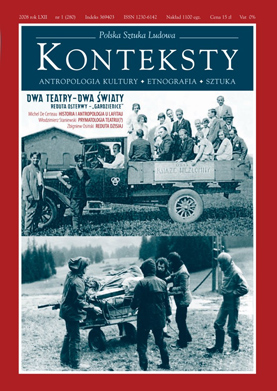„Każdy szekspirowski twór – wywołuje spór”,czyli o Hamlecie Juliusza Osterwy
“Each Shakespearean adaptation brings about a disputation” – Juliusz Osterwa’s Hamlet
Author(s): Wanda ŚwiątkowskaSubject(s): Anthropology
Published by: Instytut Sztuki Polskiej Akademii Nauk
Keywords: Osterwa; Hamlet; Reduta Theatre; anthropology
Summary/Abstract: In this article, the author presents Osterwa’s paraphrase of Shakespeare’s tragedy in the context of other Polish adaptations and translations. The essay outlines Osterwa’s approach to Shakespeare’s most famous drama and explains the artistic decisions which led to this particular interpretation of the history of Danish Prince. The founding father of the Reduta theatre wrote his adaptation in 1940, a time of crisis for the nation and in his personal life. Osterwa’s interpretation was strongly influenced not only by the harsh realities of the time but also by his innovative theatrical ideas, which were then just beginning to crystallize. Shakespeare’s Prince of Denmark is transformed into a Polish Prince of wartime. Osterwa presents him as an example of one attitude to action and war which a human being can choose in such times (the contrast to Hamlet’s position being those of Antigone, Bolesław the Bold in Stanisław Wyspiański’s drama and the Constant Prince in Juliusz Słowacki’s tragedy). Moreover, Osterwa criticizes the hesitancy and immaturity of Shakespeare’s Prince, concluding that there was no room for “Hamlets” in 1940. The Hamlet of Osterwa’s adaptation is reaching maturity and preparing to face his destiny and, ultimately, his own death. Such an interpretation derives from Osterwa placing the plot in the context of Polish literature (he makes use of Wyspiański’s translations of Hamlet’s monologues and incorporates some poetical extracts from his Study of Hamlet) and Polish reality (for example, by ‘polonising’ the setting, the characters and the language, using quotations from Polish literature, proverbs or colloquial Polish). All this gives Osterwa’s work its sense of innovation and creates an entirely new interpretation of Shakespeare’s tragedy.
Journal: Konteksty
- Issue Year: 2008
- Issue No: 01
- Page Range: 95-100
- Page Count: 6
- Language: Polish
- Content File-PDF

